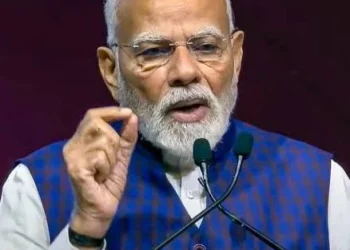Imphal erupts: Why a blanket AFSPA is crucial for peace. As protests, arson, and attacks on security forces intensify following a high-profile arrest, the limitations of Manipur’s fragmented AFSPA coverage are dangerously exposed.
BY Navin Upadhyay
June 9, 2025 – The recent outbreak of violence in Manipur’s Imphal Valley, sparked by the arrest of a leader of the Meitei outfit Arambai Tenggol on June 7, 2025, has reignited calls for the extension of the Armed Forces (Special Powers) Act (AFSPA) to all districts and police stations in the state. The unrest, marked by protestors firing at security forces, torching vehicles, and damaging properties, has exposed significant gaps in the current application of AFSPA, particularly in areas where violence has flared but remains outside the law’s jurisdiction. This article examines the reasons for extending AFSPA across all of Manipur and highlights the police stations currently excluded from its coverage, where violent incidents have been reported.
Escalation of Violence in Imphal Valley
On the night of June 7, 2025, tensions erupted in Imphal following the arrest of Kanan Singh, a prominent leader of Arambai Tenggol, by the Central Bureau of Investigation (CBI) at Imphal airport, alongside four other members of the group. The arrests, linked to criminal activities during the 2023 ethnic violence between the Meitei and Kuki-Zo communities, triggered widespread protests across the Imphal Valley. Protestors, many believed to be Arambai Tenggol supporters, clashed with security forces, set fire to a bus used for transporting central forces in Imphal East’s Khurai Lamlong area, and blocked roads with burning tires and debris in Kwakeithel, Uripok, and Koirengei. Some youths even threatened self-immolation, pouring petrol over themselves in symbolic protests. A 13-year-old boy was injured in Imphal West’s Keishampat when a tear gas shell, allegedly fired by security forces, exploded.
READ: Amid Violent Protests in Imphal, Yairipok SDC Office Set Ablaze
In response, the Manipur government imposed an indefinite curfew in five valley districts—Imphal West, Imphal East, Thoubal, Bishnupur, and Kakching—and suspended internet and mobile data services for five days to curb misinformation. Arambai Tenggol called for a 10-day “total shutdown” in these districts, further escalating tensions. Protestors also surrounded Imphal International Airport to prevent the detained leader from being moved to Guwahati, where the CBI has shifted trials due to the volatile situation in Manipur.
Violence erupts once again in Manipur!
This is happening when President’s rule is imposed in the state. Thoubal, Kaching, Imphal West, Imphal East and Bishnupur are in the grip of violence.
The situation is like this 👇
• Internet has been shut down in 5 districts of the… pic.twitter.com/TgLon7yKbw
— Jagrup Singh Parmar (@JagrupParmar) June 8, 2025
Why Extend AFSPA Across All Districts?
The Armed Forces (Special Powers) Act, 1958, grants security forces special powers to maintain public order in “disturbed areas,” including the authority to arrest without warrants, conduct searches, and use force if necessary. While AFSPA is currently in place in several parts of Manipur, its coverage is limited, leaving critical areas vulnerable to unrest. The recent violence underscores the need for a comprehensive extension of AFSPA across all districts and police stations for the following reasons:
- Widespread Unrest and Inadequate Control: The protests and clashes in Imphal Valley demonstrate the state’s fragile law-and-order situation. The inability of local police to contain the violence, particularly in areas like Kwakeithel and Khurai, highlights the need for enhanced powers for security forces to act decisively. AFSPA would enable rapid deployment and action against armed groups and rioters, preventing further escalation.
- Role of Armed Groups like Arambai Tenggol: Arambai Tenggol, initially a cultural revivalist group, has evolved into a militia-like force accused of orchestrating violence, particularly against the Kuki-Zo community during the 2023 ethnic clashes. The group’s ability to mobilize protests, block roads, and challenge security forces indicates a significant threat to public safety. AFSPA’s provisions would empower forces to neutralize such groups effectively.
- Attacks on Security Forces and Public Property: The torching of a bus used by central forces and clashes with security personnel in multiple locations reveal the audacity of protestors. Reports of firing at security forces in Imphal East and West necessitate stronger measures to protect personnel and infrastructure. AFSPA would provide legal backing for forces to respond to such threats without hesitation.
- Gaps in Current AFSPA Coverage: The violence has predominantly occurred in areas where AFSPA’s application is either absent or limited. Extending the act to all districts and police stations would ensure uniform authority for security forces to operate across Manipur, preventing jurisdictional constraints from hampering response efforts.
- Preventing Further Ethnic Tensions: Manipur’s ongoing ethnic conflict, which began on May 3, 2023, has claimed over 200 lives and displaced thousands. The recent protests, fueled by the arrest of a Meitei leader, risk reigniting communal tensions. A blanket AFSPA extension would deter further violence by signaling a zero-tolerance approach to lawlessness, regardless of community affiliations.
#Manipur. June 7, 2025.
Violent protests & gunfire erupt in Imphal after the arrest of Arambai Tenggol cadres from the Meitei community. Protests also continue in the border town of Moreh after the arrest of a Kuki accused in the murder of a Manipur Police officer. pic.twitter.com/t14eOjSh6O
— Tanushree Pandey (@TanushreePande) June 7, 2025
READ: Free Movement vs. UT will Dominate June 9 MHA-Kuki-Zo Talks
On September 26, 2023, and extended on October 1, 2024, the Manipur government declared the entire state a “disturbed area” under AFSPA, except for 19 police station areas, primarily in the Meitei-dominated Imphal Valley. These included Imphal, Lamphel, City, Singjamei, Sekmai, Lamsang, Patsoi, Wangoi, Porompat, Heingang, Lamlai, Irilbung, Leimakhong, Thoubal, Bishnupur, Nambol, Moirang, Kakching, and Jiribam.
Subsequently, on November 14, 2024, the Union Ministry of Home Affairs reimposed AFSPA in six police station areas (Sekmai, Lamsang, Lamlai, Jiribam, Moirang, and Leimakhong), reducing the number of excluded police stations to 13. However, Imphal, Porompat, Lamphel (Lamphelpat), and Singjamei remain excluded from AFSPA coverage as of the latest reports.
READ: Crime-Politics Nexus: Manipur MLAs Rush to Governor to Seek Release of Meitei Militia leader
Excluded Police Stations and Reported Violence
- Imphal Police Station (Imphal West): Protests in Kwakeithel and Uripok, under this station’s jurisdiction, saw mobs torching tyres and furniture, clashing with security forces, and storming a police outpost. The absence of AFSPA here restricted the ability of forces to act swiftly.
- Porompat Police Station (Imphal East): The Khurai Lamlong area, where a bus was set on fire, falls under this station. The lack of AFSPA coverage limited the scope of security operations, allowing mobs to escalate violence.
- Lamphelpat Police Station (Imphal West): Protests in Keishampat, where a teenager was injured by a tear gas shell, highlight the volatile situation in this non-AFSPA area. The restricted powers of security forces hindered crowd control.
- Singjamei Police Station (Imphal West): This station’s jurisdiction includes areas near Imphal airport, where protesters blocked roads to prevent the transfer of the arrested leader. The absence of AFSPA complicated efforts to secure the airport road.
These excluded stations, primarily in Imphal West and Imphal East, have been epicenters of the recent unrest, underscoring the need for AFSPA’s extension to ensure comprehensive security coverage.
While concerns about AFSPA’s implications remain, the immediate need to protect lives, property, and public order outweighs these challenges. As Manipur teeters on the brink of further chaos, a comprehensive AFSPA extension could be the decisive step needed to restore peace in the troubled state.














